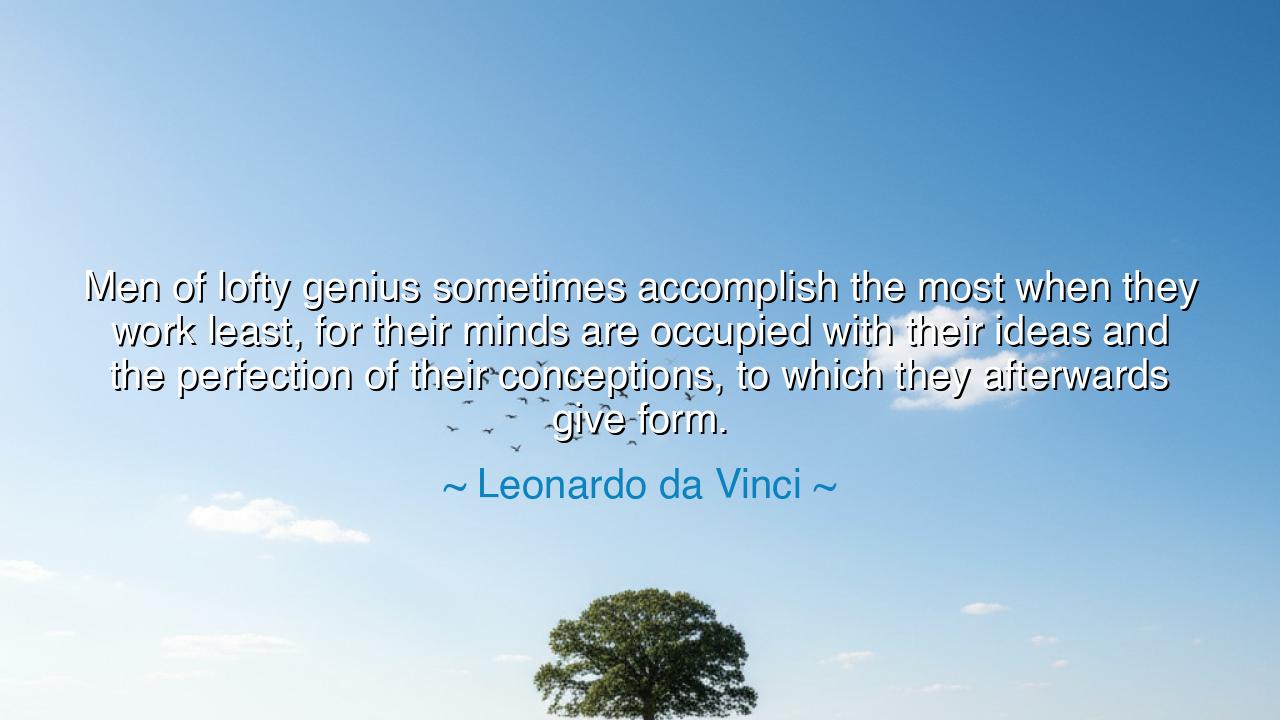
Men of lofty genius sometimes accomplish the most when they work
Men of lofty genius sometimes accomplish the most when they work least, for their minds are occupied with their ideas and the perfection of their conceptions, to which they afterwards give form.






Hear now the words of Leonardo da Vinci, the sage of the Renaissance, whose genius transcended the bounds of ordinary thought: “Men of lofty genius sometimes accomplish the most when they work least, for their minds are occupied with their ideas and the perfection of their conceptions, to which they afterwards give form.” These words ring with the wisdom of ages, urging us to understand that the power of creation does not always arise from tireless labor, but often from deep reflection and the nurturing of thought.
In the world of creative genius, the true work begins not in the physical act of labor, but in the quiet chambers of the mind, where ideas are born and take shape. These lofty geniuses, as da Vinci calls them, are not bound by the mundane rhythms of mere work. They are bound, instead, to the realm of vision—to that sacred space where thoughts swirl, collide, and form into something greater than the sum of their parts. It is here, in the stillness, in the quiet contemplation, that they shape their greatest creations. It is in this realm of mental labor, rather than physical exertion, that the seeds of innovation are sown.
Reflect, then, on the story of Archimedes, whose famous "Eureka!" moment came not through strenuous effort, but while he was submerged in his bath, contemplating the laws of buoyancy. In that moment of peaceful reflection, the great mathematician discovered the principle that would bear his name. Archimedes, much like Leonardo, found that true breakthroughs do not emerge through frantic toil but through stillness and thoughtful contemplation. He was not working in the conventional sense but was, instead, deeply engaged in the perfection of his conception. It was this mental work, this focus on ideas, that led him to the most profound discoveries.
Consider also the example of the artist Michelangelo, who would often spend days in silence, contemplating the marble before him, before ever laying a chisel to the stone. To the untrained eye, it may have seemed as though he was doing nothing. Yet, in truth, he was perfecting his vision, allowing the sculpture to emerge in his mind before ever bringing it to life. The creation was not merely a physical task—it was an act of the spirit, an act of the mind, a process of bringing forth what was already formed in his thoughts. It was in this state of mental labor that the masterpiece was born.
Leonardo da Vinci himself, a master of art, science, and invention, knew the truth of this principle. His works, from the Mona Lisa to the Vitruvian Man, were not born from mere physical toil, but from an unceasing dedication to the perfection of ideas. He would sketch endlessly, refine endlessly, his mind ever in motion, seeking to perfect the visions within. It was through this deep mental engagement that his masterpieces were brought into the world—not through hurried effort, but through the careful cultivation of thought and imagination. In this, da Vinci reveals that true genius lies not in how hard one works, but in how deeply one allows their mind to wander, to create, and to envision the world anew.
Let us take this wisdom to heart: the world often measures success by the sweat of the brow, by the tangible results of hard labor. Yet the great men and women of history remind us that true creation arises from a different source—the mind. The lesson here is clear: take time for reflection, for deep thought, for mental labor. Do not be afraid of stillness, for in those quiet moments, great ideas take shape. In a world that demands constant motion and activity, it is the one who dares to pause, to ponder, to perfect their vision in the silence of the mind, who brings forth the most profound contributions.
Thus, I urge you to value your moments of rest, for they are not idle, but fertile ground for the growth of greatness. In these moments, give your mind the space it needs to wander, to dream, and to shape your ideas. Like the great thinkers before you, cultivate the habit of contemplation, and let your mind soar to the heights of possibility. Know that work is not always about exertion; sometimes, it is about allowing the mind to weave its own tapestry. And in this, you will find your own path to creation, a path that leads not through the noise of constant labor, but through the quiet strength of thoughtful reflection.






AAdministratorAdministrator
Welcome, honored guests. Please leave a comment, we will respond soon